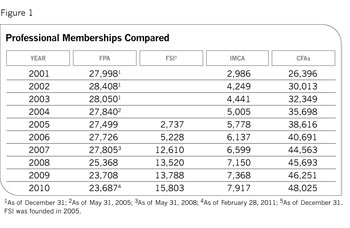The Financial Planning Association has suffered a 15% loss in membership over the past five years while other professional membership organizations for financial advisors have grown rapidly. According to statistics from the FPA, membership over the past five years declined from 27,726 to 23,687-a sudden 15% drop after years of stability.
Though the association has endured membership declines before in past economic recessions, the recent drop has occurred while other competing organizations have seen their memberships grow sharply:
The Financial Services Institute, a group formed in 2004 after broker-dealers were jettisoned from the FPA, has increased its membership more than fivefold since the end of 2005, rising from 2,737 to 16,000.
At the Investment Management Consultants Association (IMCA), which represents investment consultants and recently started a designation for wealth managers, membership has risen nearly 40% over the past five years.
Advisors have suddenly become the fastest-growing segment of the CFA population and have reshaped the CFA Institute (CFAI) into a more advisor-centric organization. The number of CFAs in the U.S. has doubled in the last five years, and 29% of them now say they manage private client assets.
An examination of membership figures from the professional organizations serving advisors is instructive because it reflects the changing character of U.S. financial advisors and financial advice. (See Figure 1.)
The growing concentration of wealth in the U.S. and the hollowing out of the middle class has produced fewer opportunities for advisors serving the middle-market-individuals with less than $1 million of assets-a target for many financial planners and FPA members. Meanwhile, IMCA and CFAI designations and programs focus on high-net-worth individuals, a target market that is growing and presumably helping to make these organizations more popular with advisors.

While other membership organizations for advisors are prospering because of these secular trends in the economy, the FPA is being tested by multiple challenges.
Much of the loss in membership in recent years can be attributed to the FPA's advocacy on major industry positions that, at times, put it in direct opposition to many of its members.








